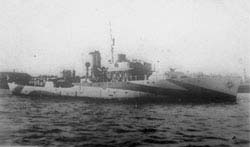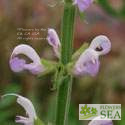Fall Planting: Commemorating the HMS Salvia

Not long ago, we stumbled on an article about a World War II British naval warship named the HMS Salvia. The name made strange sense to us due to the toughness of the genus. Many Salvias survive, and even thrive, in heat, cold, drought and other difficult conditions.
At first, it was engaging simply to ponder what species of Salvia might be the source of the warship's name.
Maybe a Meadow Sage
Salvia pratensis, also known as Meadow Clary, is the only sage native to Great Britain. However, the continental European native Salvia nemorosa is commonly referred to as Salvia in Great Britain. Finding a pure strain of either species appears to be impossible. But both are known to be central to a group of European Salvias called meadow sages. Nowadays, an abundance of their lushly blooming descendents is available in American garden centers. Some that we grow at Flowers by the Sea include:
- Iranian Oil Sage (S. atropatana)
- Red Veined Sage (S. haematodes)
- Strong Spanish Sage (S. valentina)
- Wild Sage (S. verbenacea) and
- Austrian Sage (S. austriaca)
Winston Churchill's Plan
Tough or not, Salvia became the name of a warship for a far different reason than floral resilience. The HMS Salvia was part of a fleet of 219 compact escort ships called corvettes that the British began building in 1939. All were named for flowers, from Abelia to Zinnia, and the entire group eventually became known as the Flower Class corvettes.
Canada’s Legion Magazine notes that Winston Churchill, First Lord of the Admiralty when the Second World War began, devised the naming scheme. He reportedly liked the public relations possibilities of beating Germany's "Wolf Pack" subs with ships named after blossoms.
But the HMS Salvia succumbed to a German U-boat submarine in 1941 while the British ship was trying to rescue German prisoners of war. They were on a torpedoed passenger liner that the HMS Salvia was escorting off the coast of Alexandria, Egypt.
Oddly enough, the Germans had previously sunk another British warship named HMS Salvia during the First World War.
Memorial Plantings
It is a long tradition to commemorate people and events with garden plantings. This article is a commemorative of sorts for the sailors who died on both HMS Salvia warships.
Fall is an excellent time for planting, because plants develop strong roots before spring when they need to put their energy into leaf growth. Fall is also a good time to honor the fallen as well as members of the military who are alive but served in foreign conflicts. Veteran's Day isn't far off; neither is next spring.
Please call or write if you have any questions. We're glad to share ideas.

 Salvia pratensis 'Lapis Lazuli'
Salvia pratensis 'Lapis Lazuli'
Comments
There are no comments yet.